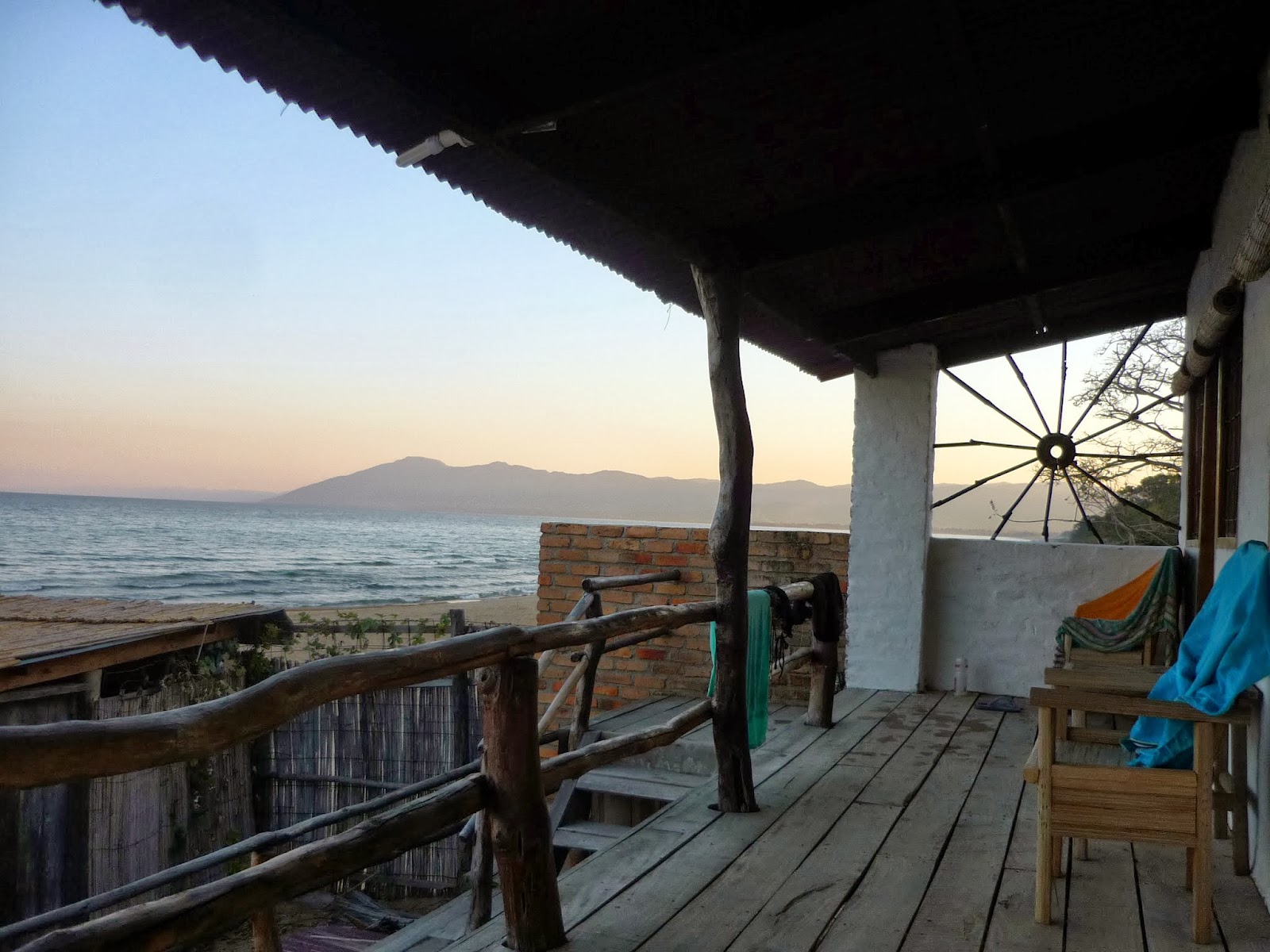My biggest fear prior to embarking on this overlanding trip was not cheetah rabies (as it could have been) or large group socializing (as it should have been); it was a specific and significant fear of swimming in Lake Malawi.
But we're clearly not there yet, because last entry left us driving and driving, relentlessly, through Zambia.
The first line of today's journal entry reads: And more driving.
We finally crossed the boarder from Zambia to Malawi, exchanging currency behind a truck with some "honest" guys who were hiding from the immigration police.
Like Zambia, Malawi had some really interesting Public Health and awareness billboards. The first one I noticed said, "End child labor in tobacco plants." Another was a cartoon couple with one peering into the trousers of the second, and a caption that says, "You can't tell by looking." Also saw a small roadside pub called, "Precious Boozing Place."
Malawi is one of the poorest countries in the world, although I wouldn't know that from driving by the houses, which are nicely-constructed brick-- leagues above the thatch of Zambia and the tin of upcountry Kenya. The reason for that is simply raw material; the soil in Malawi is good for brick. Driving through was a smorgasbord of red, brown, and dark charcoal bricks being dug, dried in the sun, or cemented into place.
Dirt turns to mud turns to brick
Building buildings
In parallel, the women were tending tarps of cassava drying out in the sun.
Blankets of cassava glow in the light
An entire country, drying its goods.
As a poor country, Malawi towns have brought me back to my time in Marsabit (without the feeling of most remote isolation). Women in brightly-colored kangas pumping water from Canadian-donated pumps and carrying large tubs and jerry cans atop their heads. Saw some kids who had concocted a slide upon a mound of dry dirt. Playing happens anywhere and everywhere.
And here, I must admit, I am remiss. I took some notes on history and politics, intending to fact-check them later for depth and detail, but here we are, and this is what the journal says:
Joyce Banda, 2nd female president in Africa; promoted to power after the president's death. Views on gays? Men tried to take away from her. Tiff with Madonna.
So if any of those leads spark an interest, feel free to research!
Which brings us now to Lake Malawi.
Lake Malawi, first views
I used to conduct mental health assessments with homeless women in San Francisco's Tenderloin District. An experience I was recently reminded of when I attended the San Francisco General Hospital AIDS Grand Rounds this week and saw my old PI present our mental health data from that study. As expected, mental health diagnoses in that population were through the roof. But the diagnoses themselves seem a bit blurry. Generalized anxiety... agoraphobia... who doesn't have a touch of those? Another diagnosis- specific phobia. Which means that anyone with a specific phobia is classified as having a mental heath diagnosis.
But I'm veering a little off-point. The point being, that while Lake Malawi was supposed to be one of the grand highlights of this overlanding trip, my background in Infectious Disease Public Health had instilled in me a very Lake Malawi-specific phobia: Schistosomiasis!
It sounds like it's spelled (Shis tow so my a sis), and is pretty fun to say aloud (SCHISTOSOMIASIS!), but less fun to get. In short, parasites who hang out with water snails burrow their way into your body through your skin. They they poke a hole in your lungs. Then you cough them up out of your respiratory tract at night, and swallow them back down into your intestines, where they wreak havoc.
It also doesn't help that I hang around with other Infectious Disease folks. A few weeks before I left Nairobi, I was having an Ethiopian feast with some doctor friends, one of whom heard about my upcoming Malawi trip and nearly shouted, "DO YOU WANT TO HAVE KIDS OR DO YOU WANT YOUR OVARIES AND OTHER ESSENTIAL INTERNAL BITS AND PIECES TO BE SCARRED FOR LIFE??" At least, that's how it echos in my memory. Doctors are scary when they're being authoritative.
So... schistosomiasis. Lake Malawi.
Laundry and dish washing in Lake Malawi
Washing dishes
Sandcastles, everywhere
That first afternoon, I overcame my biggest apprehension of the trip by submerging my feet in Lake Malawi. Despite guide assurances that no trip participant has ever been infected, and that the schistos live in other stagnant areas o the lake, I couldn't help but feel little schistomites prickling their way into my feet, up the ankles, and began the fatalistic assumption that they were then making their way towards my lungs for puncture.
Bravery(?)
But, as with most minor psychological traumas, I made it through. And roomed with the most beautiful views of dusk and dawn.
Room with a view
Sleep and wakefulness both came ushered by the sound of waves.
Lake Malawi. Alternatively called the Palindrome Lake (for its dimensions) or the Lake of Stars (for what Livingstone felt was the best celestial vantage point), there was no brilliance to the stars our first night, but the clouds broke to reveal a ladle-shaped blood-red moon on the horizon, about to dip into the lake and scoop up the fishing boat lights that I mistook for a town. That moonperch town does not exist.
































